Launching an online store can lead to tremendous profits, as there’s no limit to how much money you can make in ecommerce.
However, the path to success may be more arduous to travel down than many aspiring entrepreneurs think. Your ecommerce business will compete directly with many other larger and smaller fish in the online pond.
This means that your website may be going up against established, well-known businesses that already have a firm infrastructure and a proven marketing plan in place. These are businesses that might already be experts or trusted authorities with your target audience.
Standing apart and positioning your business, brand, and the products you sell as better options may be an uphill battle.
It’s clear that many new startups may be at a strategic disadvantage from the starting gate and may find that their online stores aren’t selling as well as they’d hoped. Nevertheless, this doesn’t mean that you should throw in the towel before you even start!
How can you improve your online store’s likelihood for success and ensure sales? The answer lies in finding a profitable ecommerce niche.
What’s an ecommerce niche?
When you sell products in a crowded marketplace, your ability to succeed is directly tied to your ability to stand out from your competition. People must also view your brand in a positive light.
If you sell the same items that the competition offers, your online store will seem generic and bland. It could even appear to be a copycat business that is presumably inferior to the established market leaders.
In this case, your ecommerce business probably won’t be able to compete with the popular market leaders. In addition, it’ll likely blend into the many other ecommerce websites that are struggling to gain traction.
While it’s fundamental for startups to showcase their individuality, they also need to sell products that their target audience wants. These are ideally products that are in high demand and that may be difficult or impossible for people to find elsewhere.
An ecommerce niche describes all of the elements that make your store and your products unique. Ecommerce niches are generally highly refined and have a specific and potentially narrow target audience.
It may seem counterintuitive to limit your site’s offerings to a select group of people and to supply a limited number of specialized products. Nevertheless, this strategy is precisely what will make your brand stand out and help your business to make your first online sale and those that follow.
Why is it important to find a niche in ecommerce?
Your ecommerce store could attempt to be all things to a huge target audience. However, this is probably not the best method. In the process, you’d be competing with many other online stores that already have a firm footing in the marketplace and an army of loyal customers.
You aren’t bringing anything new to the table, so your online store will struggle to get the attention that it needs to succeed. Unless the leaders’ customers are unhappy with the products or service they’re receiving, there may not be any reason for those shoppers to switch stores.
An ecommerce niche separates your online business from all of the others. It offers something that isn’t available on other ecommerce websites.
Your site won’t be selling generic products that your customers could get from any number of other retailers. You’ll instead be focusing on a specialized product that may be handmade, produced in small batches, or special in other ways that appeal to people.
When you find a good niche in ecommerce, your store will be able to compete against the biggest brand because it’s unique. Your products could be related to established products, but they have special features or other traits that competing products lack. This will drive customers to your website and will make your business memorable and recognizable.
What are some of the best niche examples today?
1. Who Gives a Crap: Eco-friendly and sustainable products

Sustainability has become increasingly important to shoppers in recent years, especially when it comes to younger people. In fact, a 2023 Statista survey of U.S. consumers found that 79% of Gen Z and 73% of millennial respondents consider sustainability along with other factors when selecting brands or only purchase from brands that they viewed as sustainable.
It's not surprising then that biodegradable packaging, reusable items, and eco-conscious alternatives are seeing growing popularity—and not just in the US but all around the world!
Taking consumers' evolving preferences and expectations into consideration, Who Gives a Crap offers eco-friendly toilet paper, tissues, and paper towels made from 100% recycled paper or bamboo, aiming to reduce deforestation. In addition, the company donates 50% of its profits to clean water and sanitation projects worldwide, combining environmental sustainability with social impact.
Trending items in the eco-friendly and sustainable product niche:
- Reusable water bottles
- Biodegradable kitchenware
- Solar-powered gadgets
- Menstrual cups
- Second-hand clothing
2. Wagwear: Pet care innovations
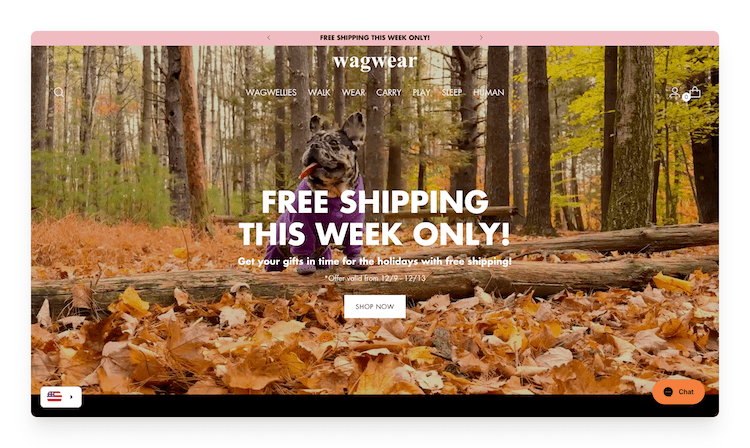
People love spoiling their pets and are constantly on the lookout for new ways to help their furry family members live happier and healthier lives. Although the pet industry is already well established and does have its fair share of big-name giants, there's still plenty of opportunity to succeed with a plethora of niches from which to choose.
If you're looking for inspiration when it comes to the pet care market, Wagwear is a prime example of success. Amy Harlow launched the company in 1998 because she found there to be a lack of dog products equal in both form and function available.
Wagwear sells stylish, functional pet supplies, including designer collars, leashes, high-quality dog clothing, and luxury beds. Their standout item, WagWellies, are 100% rubber, slip-on boots designed for durability and comfort, providing paw protection with a secure fit.
Trending items in the pet care niche:
- Automatic feeders
- GPS collars
- CBD for pets
- Food and treats for special dietary needs
- Premium grooming supplies
3. FeatherSnap: Smart home devices
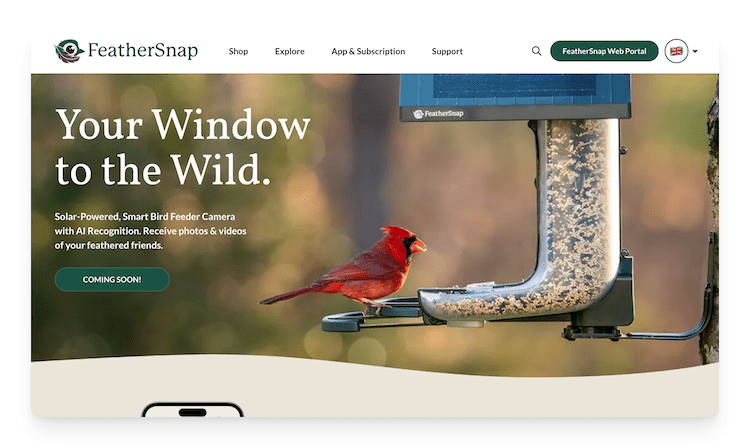
With rapid advancements in different types of technology, consumers are increasingly seeking convenience, energy efficiency, and enhanced security for their living spaces. This growing interest in recent years for smart home devices, such as smart lighting, thermostats, cameras, and more represents a major opportunity for entrepreneurs with an ecommerce website.
Another great thing about this market is that pretty much any device for the home can be turned into a smart device, as demonstrated by FeatherSnap, a solar-powered, Wi-Fi-enabled smart bird feeder equipped with a high-resolution camera and AI bird recognition technology. The perfect smart device for people who love engaging in birdwatching!
It captures photos and videos of visiting birds, sending them directly to your smartphone. Users can curate a personalized Bird Book, storing unique images and videos of various species. Designed for year-round durability, FeatherSnap ensures reliable performance in diverse weather conditions, providing an engaging and educational bird-watching experience from the comfort of home.
Trending items in the smart home device niche:
- Smart light switches
- Wi-Fi security cameras
- Robot vacuum cleaners
- Voice assistants
- Outdoor smart devices
4. Roost: Remote work accessories
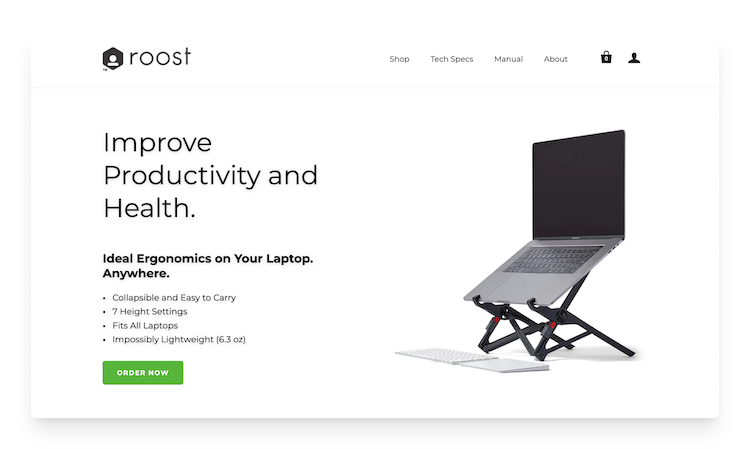
It's no secret that the COVID-19 pandemic had a significant impact on people's working habits around the world. The shift to remote and hybrid work has created a growing demand for tools that enhance productivity and comfort.
Targeting the remote worker niche market allows for innovative and customizable product offerings, appeals to professionals seeking efficiency, and aligns with ongoing trends in remote work, ensuring a steady, targeted customer base with scalable potential.
Roost is a brand known for its innovative and portable laptop stands designed to improve ergonomics for remote workers. Founded by James Olander, the brand began as a Kickstarter project after he experienced back pain from poor laptop posture. Roost's products are lightweight, durable, and adjustable, catering to digital nomads and remote professionals seeking comfort and productivity.
Trending items in the remote work accessory niche:
- Ergonomic chairs
- Desk organizers
- Webcam lighting kits
- Noise-canceling headphones
- Portable workstations
5. Kozie Clothes: Hyper-targeted fashion
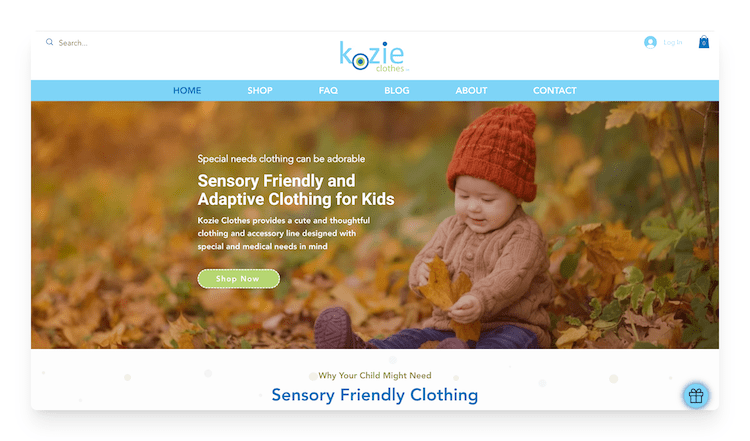
Niche fashion is an excellent opportunity for online retailers because it targets specific audiences with unique preferences, reducing competition from mainstream brands. This focus allows for personalized marketing and building strong brand loyalty.
Trends such as modest wear, adaptive clothing, culturally inspired fashion, or tech-integrated apparel create demand in underserved markets. In addition, social media and influencer partnerships amplify visibility in these niches. With lower inventory needs and a clear target demographic, niche fashion businesses can achieve profitability and scalability efficiently.
For example, Kozie Clothes, founded by pediatric occupational therapist Susan Donohoe, specializes in sensory-friendly and adaptive apparel for children with special needs. Their product range includes compression shirts, G-tube accessible bodysuits, and weighted blankets, all designed to provide comfort and therapeutic benefits. The brand's integration of neuroscience principles into fashionable designs ensures that each item is both functional and stylish.
Trending items in the hyper-targeted fashion niche:
- Heated jackets
- Sustainable apparel
- UV-protective clothing
- Plus-size activewear
- Easy-access clothing for the physically disabled
6. Canu Canteen: Outdoor and adventure gear

With the increasing costs of flying and other modes of transportation, outdoor activities are on the rise as consumers seek alternatives to traditional travel. Whether for fun, physical fitness, or mental health, a growing number of people are looking to nature, leading to a boom in the market for outdoor and adventure gear.
As with any other niche market, you don't always need to create something completely different to appeal to customers who love the outdoors. This is the case with Canu Canteen, a company that designed a modern version of the canteen, an item that's been around for ages!
Canu Canteen's 22-oz wearable water bottle is encased in neoprene and features a stretchable pouch and an adjustable strap made from reclaimed climbing rope. This design provides hands-free convenience and eco-friendly materials, making it ideal for all kinds of outdoor activities.
Trending items in the outdoor and adventure gear niche:
- Portable camping stoves
- Ultralight backpacks
- Survival kits
- Compact and multifunctional tools
- Eco-friendly outdoor clothing
7. Secretlab: Gaming accessories

The gaming industry is growing rapidly, with the number of video gamers worldwide estimated to increase by approximately 15.5% from 2024 to 2029, according to Statista. As gaming becomes a dominant entertainment form, accessories are now in high demand with avid players, whether for console, PC or mobile use.
This niche thrives on innovation, brand loyalty, and personalization, providing opportunities for unique, high-margin goods. Furthermore, as gamers are tech-savvy, it's easy to target them through digital marketing strategies, fostering strong online communities for engagement.
Specializing in high-quality gaming chairs and desks, Secretlab is a Singaporean company that sells products designed for optimal comfort and performance. Their flagship product, the Secretlab TITAN Evo, features advanced ergonomic designs, including a proprietary pebble seat base and a patent-pending lumbar support system.
Secretlab's success in the gaming accessory niche can likely be attributed to the brand's commitment to research-backed innovations, use of premium materials, and collaborations with major gaming and entertainment franchises.
Trending items in the gaming accessory niche:
- Controller accessories
- Ergonomic gaming chairs
- VR headsets
- Streaming equipment
- Gaming keyboards
8. cocokind: Natural skincare
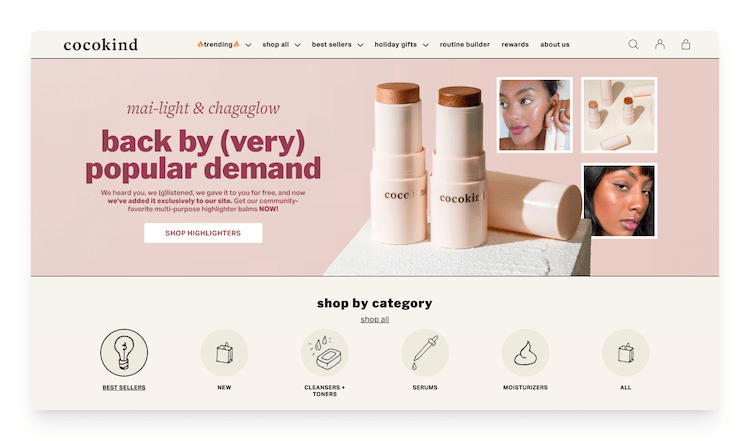
As more and more people prioritize health and wellness, they're seeking safe alternatives to chemical-laden cosmetics, leading to increasing consumer demand for clean, sustainable, and eco-friendly goods.
With growing awareness of ingredient transparency and environmental concerns, this niche attracts loyal, educated customers. In addition, social media provides a perfect platform for showcasing visually appealing items crafted from organic ingredients, making it easier to market your offerings, build trust, engage audiences, and scale in this lucrative, trend-driven industry.
One example of a brand succeeding in the natural skincare niche is cocokind, a company dedicated to providing plant-powered, sustainable, affordable, and cruelty-free products Their offerings include cleansers, toners, serums, moisturizers, and mineral-based sunscreens, all formulated with botanical ingredients to support hydration and skin barrier health.
Shoppers are fans of cocokind due to the brand's commitment to transparency, sustainability, and promoting self-acceptance in the beauty industry, making sure that customers feel celebrated and accepted as they are.
Trending items in the natural skincare niche:
- Facial cleansers
- Lip balms
- Body butters and lotions
- Face masks
- Sunscreens
9. Calm app: Mental wellness and mindfulness products

A rising global awareness of mental health and self-care creates demand for tools that promote relaxation, focus, and holistic well-being. The niche attracts diverse demographics and offers recurring revenue opportunities through subscriptions or consumables.
What's more, the relatively low competition in specialized segments and high emotional connection to the products drive customer loyalty and growth potential. One specific area that's seen significant growth in recent years is apps that concentrate on mental health. According to ORCHA, the use of mental health apps grew by 200% during the COVID-19 pandemic and the lockdowns that followed.
Calm is one such app that's achieved considerable success. The popular app is designed to enhance mental well-being by offering guided meditations, sleep stories, relaxing music, and gentle movement sessions. It stands out for its diverse content, including daily new sessions, celebrity-narrated sleep stories, and a user-friendly interface, catering to various aspects of mental health.
Trending items in the mental wellness and mindfulness niche:
- Weighted blankets
- Meditation aids
- Stress-relief gadgets
- Journals and planners
- Self-care kits
How do you find a niche for your online store?
Finding the niche for your online store is one of the first steps that you should take before you start an ecommerce business. Your niche will define who your audience is, your pricing, and your marketing content and strategy for your products.
It can impact the brand image that you need to develop, which resources you need, and many other factors.
Because choosing the right niche for your new venture is fundamental to success, you should spend ample time brainstorming ideas and researching the possibilities thoroughly.
As you explore options, use these tips to help you start to narrow down your choices in your search for the right niche.
Find or design products that help fix a problem
When you think about some of the hottest products to hit the market in recent years, you’ll undoubtedly remember products that solve a specific problem.
You might also recall popular goods that improve the consumers’ lives in meaningful ways. Keep in mind that this doesn’t mean that you need to invent a new product.
You may instead just find a better way to make that product, such as with special features.
For example, wireless headphones and gaming controllers dramatically improved how the products are used. They continue to be in high demand with people today and are often preferred by consumers over the original products.
You could also redesign a product from a style standpoint or with different materials. Take the example of a mesh-style dog harness. It was an upgrade to a nylon harness that may have been difficult for some people to put on their dog and uncomfortable for the dog to wear.
Incorporate your passion
While sales and a large profit may be driving factors for starting a new ecommerce business, you must find a product that you can stand behind. A large portion of your waking hours for years to come may be focused on selling your product and growing your business.
To be truly successful and find joy in what you do on a daily basis, you need to be passionate about what you are selling.
This passion can be derived from several things. For example, you may have a strong personal interest in a related activity, such as a hobby. Perhaps the niche has meaning to you because of a major event in your personal or professional life.
In addition to being personally interesting or fulfilling to you, your passion for your niche can be used to drive branding and to connect with your consumers in a meaningful way. By doing so, your passion for your product can actually be used to further define your niche.
Find out what niches are trending
Regardless of how passionate you are about a niche, that passion alone is not enough to make your business successful. There must be a reasonable demand for your niche products for them to sell.
Researching trending products and niches is an essential step in your decision-making process. Google Trends is an excellent resource that you should tap into before you start to define your niche.
As you explore trending niches, you must understand what the demand is for your niche as well as who needs or wants your niche products. The data from your niche research is going to open your eyes to critical aspects of product viability.
The best time to jump in the market is when your niche is just starting to trend. Though research and planning are important, delaying the launch of your business gives other players time to begin selling and become established before your launch.
When you find a great idea that makes sense and that you can stand behind, all you need is the confidence to act and launch your amazing business!
Derive inspiration from your community
Product ideas that you’re passionate about and that you have experience with are also those that hit close to home. Simply by speaking with friends, family members, and coworkers, you can identify common issues, complaints, or concerns.
When you pay attention to the needs of others, you can quickly determine ways to serve your community by meeting their needs.
Keep in mind that you can tap into inspiration from virtual communities as well when determining the best product to sell. This includes groups or forums that you are a member of on a personal or professional level.
Be sure to take advantage of social media content too. By exploring various social media platforms and paying attention to what your followers are saying, you'll have access to a wide range of consumers.
Your community will not necessarily hand out a few great niche product ideas for you. They’ll instead offer inspiration from which you can draw as you explore exciting possibilities.
As you search for a good opportunity for your niche ecommerce business, pay attention to local and online businesses as well. What are their weaknesses on which you could improve?
This extends to operations and marketing as well as to products. You don’t need to reinvent the wheel if you can find a better way to produce and offer people a great product.
Learn about different customer personality types
Your target audience is going to affect your ecommerce store’s profitability and viability in many ways. These individuals should be as passionate about your products as you are. They should also have a clear need or desire for those products.
You’ve already determined that there’s a target audience for your niche and what their demographics are. Now, you need to dig deeper to truly get to know your future customers to be able to successfully sell to them.
Aspiring entrepreneurs generally understand the need to tailor a marketing message to their target audience. However, this goes beyond identifying and appealing to a need or want.
Behavioral economics directly feeds into how you market your products to consumers. It can also play a role in how easy or difficult it is to connect with and to motivate your consumers to visit your website and to make a purchase.
Research keywords
How big is the market for your niche product? How easily can you reach your audience through free or organic marketing?
You can glean valuable information to answer both of these questions through keyword research. There are various websites and apps that tell you how popular keywords are in searches today and about affiliated searches that may be relevant to you.
As important as free marketing from a well-designed SEO campaign is, new ecommerce businesses often need to pay for advertising as well. Data regarding keyword popularity and relevance can open your eyes to the cost of running a pay-per-click campaign using preferred keywords.
Take a look at the competition
Before jumping into a niche with the highest degree of confidence, you must identify who your leading competitors would be. Pay attention to the websites that are targeting the same keywords and the same target audience as you would be targeting with your ecommerce business.
Also take a look at your competitors' social media accounts. Reviewing the competition's social media content can aid in learning more about not just what goods to sell but how to promote them effectively.
How are your products better and worse than theirs? What is their pricing strategy? How are they marketing to their target audience?
Through extensive research on your competition, the viability of your niche will come into focus. You may discover exciting ways to redefine your niche idea so that it can potentially be more successful and profitable for you.
On the other hand, researching competitors may reveal that you should go back to the drawing board. The best time to discover that your niche is not viable is before you invest energy, money, and other resources into it.
Examine your resources
Identify all of the resources that you need to run all aspects of your new business. This includes production supplies, tools, and equipment. It also involves packaging and shipping materials, office equipment and supplies, and labor.
Now is the time to research the cost of all of the resources that you don’t already have on hand. You can then determine the viability of obtaining those resources soon.
Some business plans approach growth with a slow and steady plan. However, lining up all resources before your launch may facilitate smoother growth with fewer obstacles. You’ll be able to focus on growth, product development, and customer service rather than worrying about how you’ll process the next big order.
As you assess your resources, focus on financial resources that are immediately available to you. You also should think about your production or manufacturing space as well as space for storing supplies and finished goods.
Determine your product margin and pricing
No matter what product you sell, your ecommerce business won’t succeed if it doesn’t have sales and it can’t turn a profit. Product pricing and profit margins directly feed into overall profitability, so they require your full attention as you research niche products.
The cost of every item that goes into the production, packaging, and shipping of the products must be fully documented. You also need to estimate your company’s monthly overhead.
After you have these expenses realistically outlined, analyze the market to determine a fair market price for the goods you want to start selling. You can then calculate the profit margin per item and estimate how many products you need to sell to break even and earn a profit.
The profit margin suggests the percentage of sales that have become profits. Each entrepreneur’s desired profit margin is set at a unique level. Be sure to research what the ideal figure is for your chosen sector and product.
If the numbers don’t work at this stage in the process, you may need to research ways to reduce expenses. Another idea is to improve your product so that you can reasonably sell it at a higher price.
Use ads to test the market
Conducting market research may be easier to do than you think. You can easily create tailored ads that center on different features and pain points. You can also customize ads to appeal to different individuals using various messages.
By comparing the response of different ads, you can get a firm grasp on who your target audience is and what content the members of this audience search for. While there’s a cost associated with running multiple ads, this is generally more cost effective than learning the ropes and making adjustments after the launch.
Understand that popular niches today may change in the future
In the ecommerce world, hot trends evaporate just as quickly as they materialize. People are constantly looking at current trends with the goal of wanting to find or create the next big thing.
This means that there are always going to be future products that are better or more popular than today’s new products. However, this shouldn’t dissuade you from pursuing your ecommerce business idea!
Because a niche that's hot today is going to fade, your business’s success lies in your ability to be flexible and to remain relevant in the market. All of the research and planning that you’ve done up to this point should be included in your business development plan going forward.
The most successful ecommerce businesses are always one step ahead and positioned to act quickly when the market changes.
As ecommerce continues to grow, the number of ecommerce stores that are trying to tap into a potential goldmine will also grow. While some markets are already saturated and may be difficult for an entrepreneur to break into, others are developing or are untapped.
These provide entrepreneurs like you with great opportunities to serve a need and to turn a profit in the process.
Ready to find your ecommerce niche?
Determining the right niche for your new ecommerce business requires deep personal reflection. It also needs plenty of market research, number crunching, and hard work.
It makes sense to leave your business some wiggle room for growth. You understandably need to focus your attention on developing your niche products today. However, you should also keep an eye on potential future products that fall under your niche's umbrella to help maximize your sales later on.
You can begin by identifying what your interests and passions are. Keyword research and general observations can guide you from there.
Because of how quickly trends change in the market, be prepared to hit the ground running and create your online store after you’ve fully vetted an excellent idea for a niche product!










